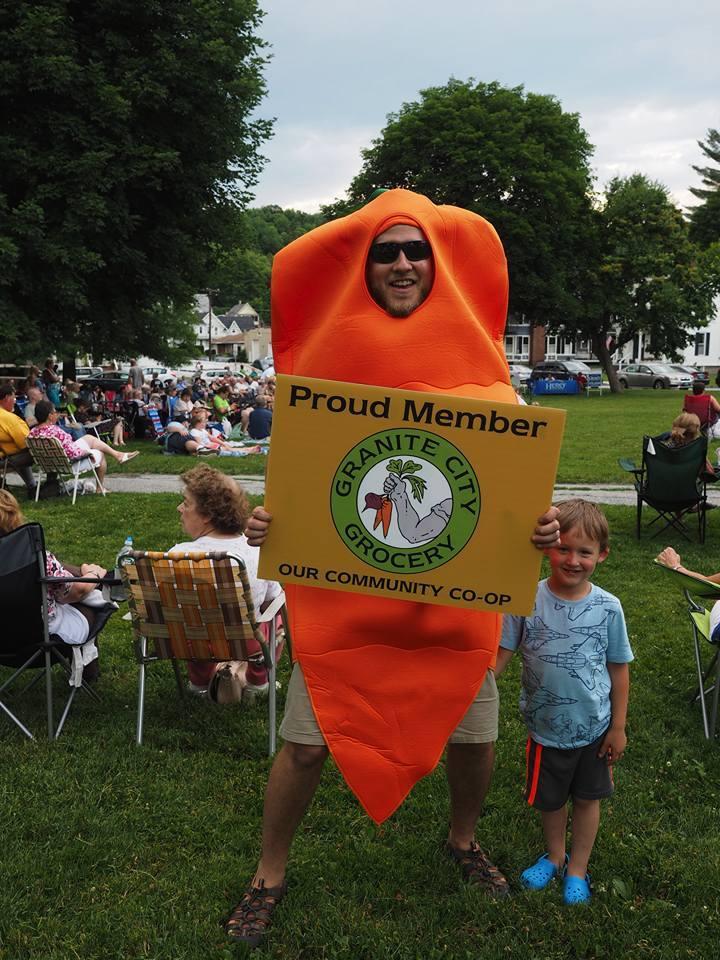Granite City Grocery Members Determined to Keep Moving
Startup in Vermont


Granite City Grocery
BARRE — Granite City Grocery doesn’t have a home, but it might have something just as important as its recently rekindled search for a site continues: momentum.
Judging from the Barre-based cooperative’s annual meeting at the Old Labor Hall on Wednesday, members — new and old — are still bullish about the now four-year-old idea of opening an accessible grocery store in the Granite City.
No, it isn’t up and running in Barre City Place as some suggested early on it could be. And, following a months-long analysis, the co-op’s elected board backed away from the idea of buying the former Homer Fitts’ building owned by Barre Mayor Thomas Lauzon.
It wasn’t an easy decision, President Reed Curry told more than 50 people who attended the evening meeting at the labor hall, but, she stressed, it was the right one.
“We ultimately decided that this location was not the home for us,” she said. “It was not the home we hoped it would be.”
According to Curry, the board’s decision was based on an architectural analysis that underscored the limitations of the location and a financial assessment that highlighted the high cost of trying to make it work. It was, she said, the prudent play for an organization that won’t have a second chance to get it right.
The explanation wasn’t greeted by moans and groans as it might have been. By the time Curry was finished talking, she received a hearty round of applause — one of several that punctuated an upbeat evening during which optimism and enthusiasm were running high even as board members sought to surgically temper expectations.
Phil Kolling said the store won’t open this year and it may not open next year, or even the year after that, but, like Curry, he said the board has been busy building relationships, learning from its investigation into Lauzon’s building, and is prepared to act swiftly if an opportunity presents itself.
Translation: Granite City Grocery might not be “coming soon,” but it is “coming,” and if cash registers are ringing some time in the next three years, Curry said that would be right within the average time — five to seven years from conception — that it takes to get a startup co-op off the ground.
“We’re right on track,” she said.
Kolling agreed.
“The experts tell us we’re right where we should be,” he said. “We’re not behind. We are not ahead. We are right where we should be.”
According to Kolling, the co-op’s consultants have consistently preached patience.
“Those co-ops that get a little bit impatient and jump the gun and try to open early … the failure rate goes way up,” he said.
Curry described the investigation of Lauzon’s property as a valuable learning experience, even if it ended with the board deciding to look elsewhere.
According to Curry, the process enabled the board to identify a short list of largely non-negotiable needs. The co-op needs a location that is both visible and accessible, has truck access and 40 to 50 parking spaces either on site or close by.
“That’s a ‘deal, or no deal’ for us,” she said of the parking needed for the 10,000-square-foot grocery store the board is hoping to develop.
Asked if the board had sites currently under consideration, Curry’s cryptic response generated good-natured laughter.
“We do,” she said.
Curry went on to explain that, unlike Lauzon’s property, the board wouldn’t be publicly discussing locations before a final determination is made.
“When we ultimately reveal where our location will be, we will have decided, and it will be our home,” she said, near the end of a meeting that saw Eileen Peltier, executive director of Downstreet Housing and Community Development, speak forcefully on behalf of the co-op’s work, and members fill five of nine board seats.
Phil Cecchini, Nick Landry and Chris Riddell were all re-elected to the board and two new members — Denise Gagne and Jo Perreault — were elected to replace retiring board members Phil Gentile and Rebecca Pincus.
With the site search ongoing, Curry said the board’s immediate next step would involve a summer-long push to boost membership from 620 to 700.
“We need to be continually growing our membership right through the day we open our doors,” Curry said, citing the co-op’s ultimate goal of 1,200 invested member-owners.
Curry said the ongoing recruitment effort will hopefully be aided by benefits now available to the co-op’s members. Three local businesses — Richard J. Wobby Jewelers, Nelson Ace Hardware and Copy World — are all offering 10 percent discounts to co-op members, who also enjoy privileges at Hunger Mountain Co-op in Montpelier.
The co-op’s “Summer of 700” got off to a good start at the annual meeting with at least three new members agreeing to make the $200 commitment, payable in monthly installments of $10.
Laurie Elliott Giroux, who attended the meeting with her husband, Brian, signed on, as did fellow Barre residents Kelley Kendall and Kim England.
Elliott-Giroux said she’d seen the “We Own It” signs promoting the co-op around town last year, but wasn’t sure what to make of them.
“I didn’t see a store popping up anywhere,” she said.
Elliott-Giroux said she was pleased to hear plans for a cooperatively owned grocery store are progressing and she couldn’t wait for it to open.
“I would much rather give my money to my community than to some large company that is located somewhere else,” she said.
Board members received high marks for their new logo — a riff on the hammer-wielding flexed arm that is carved on the circular granite medallion above the entrance to the Old Labor Hall. Instead of a hammer, the arm is holding a couple of carrots and a radish.
Peltier, who once managed the Plainfield Co-op, praised the GCG board for its commitment to bringing fresh, healthy foods and affordable groceries to a community that meets the definition of a “food desert.”
“I commend you for your desire to do something in downtown Barre — it will do a lot more than just create another co-op,” she said, praising the board for its persistence.
“Don’t take that lightly, it’s something to be incredibly proud of,” she said, explaining that advancing a project from conception to construction is a time-consuming endeavor.
When the time comes, Peltier’s organization could be an important ally for Granite City Grocery.
July 01,2016







